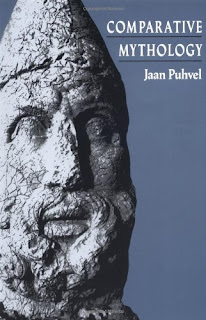 I chose to read/review Jaan Puhvel's Comparative Mythology for my first Dedicant Path book review
I chose to read/review Jaan Puhvel's Comparative Mythology for my first Dedicant Path book review with plenty of warnings about the depth and "academic-nishness" of the material. With a background in anthropology, I was prepared to tackle the materials, having a strong foundation in European mythology and first-hand experience reading Levi-Strauss and the like in grad school. That being said, this is definitely not a book for beginners.
There is little doubt that Comparative Mythology was written as a text, as its format and content is clearly designed to follow a course syllabus. However, the scope and depth of the analysis, coupled with the repeated use of specialized and obscure terminology belies the fact that this would not be a textbook for a 100 level course. If reading this book, be prepared to take copious notes and have a dictionary (and possibly, a world history companion) at your side if you desire to retain and process the material.
And what material is there? Gold. For all his wordiness there is no doubt that what Puhvel has compiled in print is a thorough, near-exhaustive survey of Indo-European (IE) mythology. Starting from an introduction outlining the distinction between mythos, mythology and history, Puhvel then proceeds to review the mythology of several ancient IE cultures working his way through Vedic India, ancient Iran, ancient Greece, ancient Rome, and Celtic, Norse and Balto-Slavic mythologies.
With each chapter he briefly reviews geographical and historical highlights of the period, and epic sagas are also discussed for the Vedic, Iranian and Norse cultures.
Personally, I enjoyed this read despite the amount of discipline it took to accomplish the task. I greatly appreciated his reviews of Vedic and Iranian myths and applauded his outright acknowledgement that, for years, Greek myth has been The Standard for comparative mythology regardless of its obvious fusion with nearby cultures. I even thought his review of Slavic mythology (a subject I myself have researched extensively) provided a thoughtful and well-supported foundation even with the limitations of such scant documentation for that subject.
That said, there were times where, as the reader, I was ready to give Puhvel a stern talking to. His chapters on both Vedic and Iranian epics were written in such a way that a student new to comparative mythology had no hope but to be completely lost and confused. In both of those chapters (and others as well) his references to obscure tribes and historical events makes for a difficult read for even the most dedicated student of ancient world history. With a topic that literally covers thousands of years and geographical miles, it would be nice if Puhvel provided brief historical timelines and/or maps in respective chapters. Additionally, there are times where his handling of some subjects seems unusual; there is no discussion at all of Hestia/Vesta in the Greek and Roman materials, and his Iranian references hinge on discussions of Zoroastrian concepts, rather than pre-Avestan sources and reconstructions. There are no explanations offered for either example.
Exhaustive? Yes. Herculean? Yes. Worth taking the time to read? Probably. For someone dedicated to understanding the undercurrent of similar themes and characters in IE mythology the reading of Jaan Puhvel's Comparative Mythology should be on their "Must Do" list. For the more casual student of IE studies there are many other available titles that would better suite the lay reader.
No comments:
Post a Comment